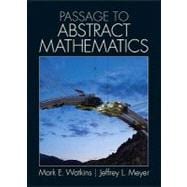
Note: Supplemental materials are not guaranteed with Rental or Used book purchases.
Purchase Benefits
What is included with this book?
Mark E. Watkins is a professor of Mathematics at Syracuse University, having joined its faculty in 1968. He received his BA in mathematics from Amherst College and his MA and PhD from Yale University as a student of Oystein Ore. He has published more than 60 research articles in combinatorics, particularly in algebraic and topological graph theory, and has coauthored (with J.E. Graver) the graduate text Combinatorics with Emphasis on the Theory of Graphs (GTM 54, Springer-Verlag, 1977) and Locally Finite, Planar, Edge-Transitive Graphs (Memoir 601, Amer. Math. Soc. 1997). He has held visiting positions in Canada, France, Austria, and New Zealand, has been twice awarded a DAAD stipend to Germany, and enjoys lecturing in French or German when appropriate. He has taught a full range of undergraduate and graduate mathematics courses and supervised six PhD students. As former Associate Chair for Graduate Studies and a member of the Future Professoriate Program, he has had a special commitment to teaching graduate students how to teach mathematics to undergraduates. His other interests are playing trombone and individual sports.
Jeff Meyer joined the mathematics faculty of Syracuse University in 1997. He earned his BS from the University of Minnesota in mathematics education. His PhD in number theory is from the University of Illinois where he was the tenth PhD student of Bruce C. Berndt. He has published both research and expository papers in analytic number theory, especially Dedekind Sums. Before beginning his graduate studies, he taught junior and senior high school mathematics for five years. He remains active in the professional development of secondary mathematics teachers by giving lectures and conducting workshops for the Syracuse University College of Education and by meeting with in-service teachers through Syracuse University Project Advance. In his spare time he enjoys outdoor activities and traveling with his family.
Preface for the Instructor vii
Preface for the Student xiii
1. Logic and Proof
1.1 Proofs, what and why?
1.2 Statements and Non-statements
1.3 Logical Operations and Logical Equivalence
1.4 Conditionals, Tautologies and Contradictions
1.5 Methods of Proof
1.6 Quantifiers
1.7 Further Exercises
2. Numbers
2.1 Basic Ideas of Sets
2.2 Sets of Numbers
2.3 Some properties of N and Z
2.4 Prime Numbers
2.5 gcd’s and lcm’s
2.6 Euclid’s Algorithm
2.7 Rational Numbers and Algebraic Numbers
2.8 Further Exercises
3. Sets
3.1 Subsets
3.2 Operations with Sets
3.3 The Complement of a Set
3.4 The Cartesian Product
3.5 Families of Sets
3.6 Further Exercises
4. Induction
4.1 An Inductive Example
4.2 The Principle of Mathematical Induction
4.3 The Principle of Strong Induction
4.4 The Binomial Theorem
4.5 Further Exercises
5. Functions
5.1 Functional Notation
5.2 Operations on Functions
5.3 Induced Set Functions
5.4 Surjections, Injections, and Bijections
5.5 Identity Functions, Cancellation, Inverse Functions, and Restrictions
5.6 Further Exercises
6. Binary Relations
6.1 Partitions
6.2 Equivalence Relations
6.3 Order Relations
6.4 Bounds and Extremal Elements
6.5 Applications to Calculus
6.6 Functions Revisited
6.7 Further Exercises
7. Infinite Sets and Cardinality
7.1 Counting
7.2 Properties of Countable Sets
7.3 Counting Countable Sets
7.4 Binary Relations on Cardinal Numbers
7.5 Uncountable Sets
7.6 Further Exercises
8. Algebraic Systems
8.1 Binary Operations
8.2 Modular Arithmetic
8.3 Numbers Revisited
8.4 Complex Numbers
8.5 Further Exercises
Index of Symbols and Notation
Index
The New copy of this book will include any supplemental materials advertised. Please check the title of the book to determine if it should include any access cards, study guides, lab manuals, CDs, etc.
The Used, Rental and eBook copies of this book are not guaranteed to include any supplemental materials. Typically, only the book itself is included. This is true even if the title states it includes any access cards, study guides, lab manuals, CDs, etc.